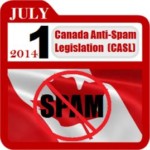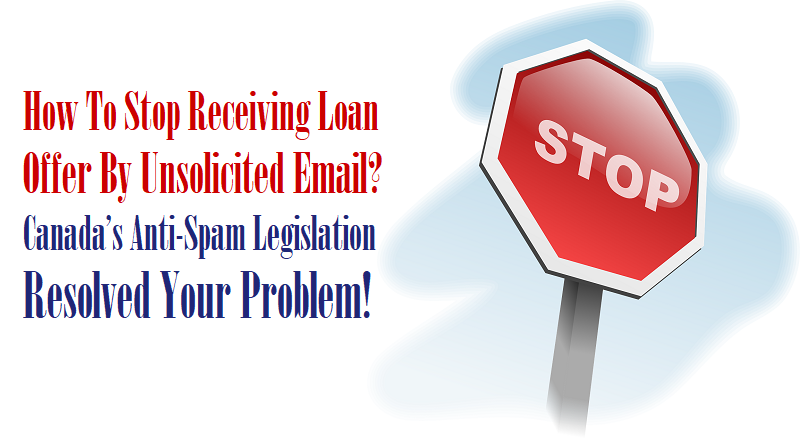How To Stop Receiving Loan Offer By Unsolicited Email?

Are you feeling uneasy receiving a loan offer by unsolicited email? You should not worry about it as Canada’s anti-spam legislation resolved your problem!
What to do when you receive an online loan offer by unsolicited email?
Please don’t respond to such kinds of unsolicited emails, there is a possibility it may look like your online loan offer has been coming from some of the reliable and well-established sources but remember it’s a scam because financial companies, banks, lenders, businesses and organizations don’t send such scam messages and emails and also don’t let their representatives do an unlawful and unethical way to collect leads for them. Loan offers like personal loans, student loans, car loans, credit cards and mortgages are one of the high demand personal financial need of general people that’s the reason it persuades negative practice and where online media supports such kinds of spammers due to bulk and fast delivery of their unsolicited commercial messages to great numbers of people at once. Besides educating consumers to stay safe online there was a great need to implement laws on spam and other electronic threats (Government of Canada Anti-Spam Legislation) to help and protect Canadians while ensuring that businesses can continue to compete in the global market.
Solicited vs. unsolicited definition: It can be any instance used to sell or offer any service through physical or digital media like mail, email, SMS, telephone and, at home or office is either solicited or unsolicited – “solicited email is any message or a newsletter sent only to recipients who have requested it, where unsolicited email (known as spam), is any message, posting or a newsletter, that is sent to recipients who haven’t specifically requested the email or any kind of subscription service”.
Most of the loan scams on the internet took place through unsolicited emails; loan scam emails are specially written for a borrower looking for instant relief and kind of loan that no one willing to give borrower having poor credit rating, no credit and critical credit problem with their credit history that’s the reason most of the loan scams in Canada effects people looking for cash advances and credit repair, search online and you will find credit repair scam, student loan scam, payday loan scam and bad credit loan scams are most prominent searches of loan scams online.
There is good news for Canadian consumers, as the new Canadian Anti-Spam Legislation taking effect as of July 1, 2014, will definitely illuminate such kinds of spam commercial messages related to loan offers and all the other consumer products and services. The new law will not even help Canadian consumers avoid spam and other electronic threats but also individuals, businesses and organizations involve in the process make their privacy policies more strict in relation to marketing their products and services.
Government of Canada Anti-Spam Legislation (CASL)
The New Anti-Spam Act will begin to take effect on July 1, 2014! Government of Canada Introduces Anti-Spam Legislation imposes more stringent requirements on the use of commercial email than the U.K. and U.S. do. Here are some of the important things about Canada’s Anti-Spam Legislation that every marketer need to know:
The CASL regulates “commercial electronic messages (CEM),” which is defined very broadly and includes email, SMS text message, instant messenger and other similar means of telecommunication. Pursuant to the legislation, essentially any email or text that is sent for commercial purposes will be classified as a CEM unless it falls into one of the enumerated exceptions.
In order to send CEM’s, you must have received express and/or implied consent from the consumer. You cannot send unsolicited CEM’s. CASL requires CEM to contain the following information:
- (i) the identity of the sending business and/or the business on whose behalf the message was sent (including d/b/a information);
- (ii) contact information, including a physical address and either a telephone number, email address, or web address of the sender or on whose behalf the message was sent, all of which must remain accurate for at least 60 days; and
- (iii) an unsubscribe mechanism.
To obtain express consent to send CEM on your post page, you must not use any pre-checked tick boxes and the following information must clearly be identified as part of the request:
- (i) the purpose for the consent;
- (ii) the identity of the business seeking consent and/or the business on whose behalf consent is sought, including d/b/a information;
- (iii) contact information, including a mailing address and either a telephone number, email address, or web address of the business seeking consent or the business on whose behalf consent is sought; and
- (iv) a statement that consent may be withdrawn.
A violation of CASL may result in severe monetary penalties by either an administrative or private action. For more information about the law, please visit http://fightspam.gc.ca/eic/site/030.nsf/eng/home
Remember, CASL is protecting Canadians not just from potential unwanted emails, but it applies to every commercial electronic message (CEM) sent by any medium that is accessed on a Canadian computer, moreover if you are using social networks like Twitter, Facebook, or Linkedin to send the commercial type of emails to fellow members then it is also treated as CEM under CASL. For all foreign marketers either from Australia, U.K., U.S.A. and, or else doing business in Canada are advised to follow the rule and organize their next marketing campaigns accordingly.
For Canadian lenders, financial companies and marketing personals; this news article does not constitute legal advice nor should it be used as a substitute for legal counsel. We recommend you consult with your legal and compliance department to ensure all requirements of the new law are properly implemented.
For Canadian consumers, borrowers and buying personals; Hopefully it will discourage all kinds of unsolicited mailings, now you will not receive commercial emails and messages containing unsolicited loan offers and any kind of other consumer products and services like before in Canada and if you still receive such unwanted and, or unsubscribed unsolicited commercial electronic messages and emails, remember, you have right to complain it otherwise, mark them spam messages and send them to junk folder of your email account, click the unsubscribe link promptly to stop receiving further unsolicited commercial messages in future. Hope for the best and be protected, thanks.




